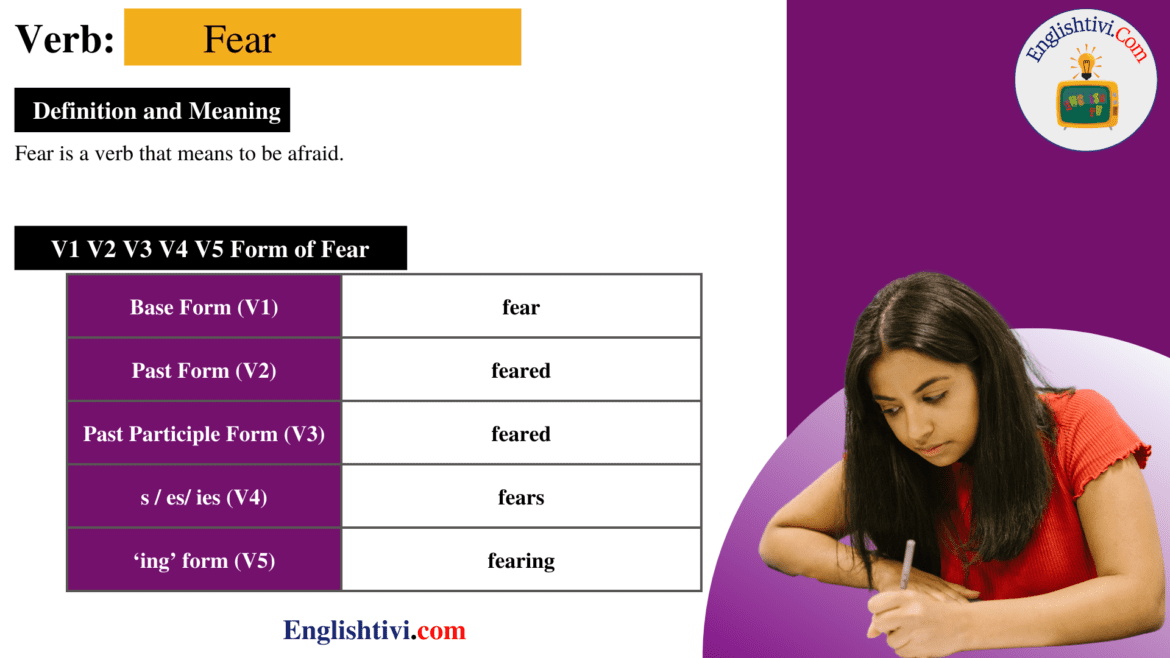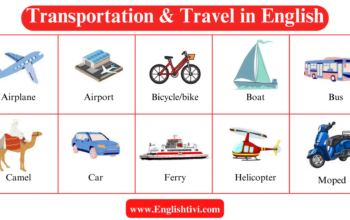Fear V1 V2 V3 V4 V5 is one of the verbs that are used very commonly in English tests as well as in everyday communication. Also, because it’s an irregular verb, fear doesn’t follow the regular rule. The verb “fear” has five different forms: base form, past simple, past participle form, present perfect, and present perfect participle. So what is fear‘s past? How do conjugate verbs with fear verbs?
⏩ Sign Up to Get Bonus
Let’s find out with English tivi in the article below.
See more at: Verbs
Fear of Definition and Meaning
Fear is a verb that means to be afraid.
V1 V2 V3 V4 V5 Form of Fear
| Base Form (V1) | fear |
| Past Form (V2) | feared |
| Past Participle Form (V3) | feared |
| s / es/ es (V4) | fears |
| ‘ing’ form (V5) | fearing |
Fear of Past Simple V2
The verb Fear is also employed in its V2 form as “feared”’. It is used to indicate the past tense in sentences.
Fear of Past Participle V3
The V3 form is identical to the V2 form. The V3 form is “feared”. Feared is used in the past or present perfect tense.
+ In the present perfect tense, we use the word V1 as ‘have + feared‘ or ‘has + feared'.
- I, you, and we are used as ‘have + feared‘.
- ‘has + feared' is used for he, she, and it.
+ If you need to use the past perfect tense, use ‘had + feared‘ regardless of the subject.
You might also like: ALL the English Grammar Basics You Need
Conjugation of Fear V1 V2 V3 V4 V5
| Conjugation table: Fear | |||
| Number | Singular | ||
| Present Simple of fear | I | You | She/He/It |
| fear | fear | fears | |
| Plural | |||
| We | You | They | |
| fear | fear | fear | |
| Present Continuous of fear | I | You | She/He/It |
| am fearing | are fearing | is fearing | |
| Plural | |||
| We | You | They | |
| are fearing | are fearing | are fearing | |
| Present Perfect of fear | I | You | She/He/It |
| have feared | have feared | has feared | |
| Plural | |||
| We | You | They | |
| have feared | have feared | have feared | |
| Present Perfect Continuous of fear | I | You | She/He/It |
| have been fearing | have been fearing | has been fearing | |
| Plural | |||
| We | You | They | |
| have been fearing | have been fearing | have been fearing | |
| Past Simple of fear | I | You | She/He/It |
| feared | feared | feared | |
| Plural | |||
| We | You | They | |
| feared | feared | feared | |
| Past Continuous of fear | I | You | She/He/It |
| was fearing | were fearing | was fearing | |
| Plural | |||
| We | You | They | |
| were fearing | were fearing | were fearing | |
| Past Perfect of fear | I | You | She/He/It |
| had feared | had feared | had feared | |
| Plural | |||
| We | You | They | |
| had feared | had feared | had feared | |
| Past Perfect Continuous of fear | I | You | She/He/It |
| had been fearing | had been fearing | had been fearing | |
| Plural | |||
| We | You | They | |
| had been fearing | had been fearing | had been fearing | |
| Future Simple of fear | I | You | She/He/It |
| will/shall fear | will/shall fear | will/shall fear | |
| Plural | |||
| We | You | They | |
| will/shall fear | will/shall fear | will/shall fear | |
| Future Continuous of fear | I | You | She/He/It |
| will/shall be fearing | will/shall be fearing | will/shall be fearing | |
| Plural | |||
| We | You | They | |
| will/shall be fearing | will/shall be fearing | will/shall be fearing | |
| Future Perfect of fear | I | You | She/He/It |
| will/shall have feared | will/shall have feared | will/shall have feared | |
| Plural | |||
| We | You | They | |
| will/shall have feared | will/shall have feared | will/shall have feared | |
| Future Perfect Continuous of fear | I | You | She/He/It |
| will/shall have been fearing | will/shall have been fearing | will/shall have been fearing | |
| Plural | |||
| We | You | They | |
| will/shall have been fearing | will/shall have been fearing | will/shall have been fearing | |
| Conditional Present of fear | I | You | She/He/It |
| would fear | would fear | would fear | |
| Plural | |||
| We | You | They | |
| would fear | would fear | would fear | |
| Conditional Perfect of fear | I | You | She/He/It |
| would have feared | would have feared | would have feared | |
| Plural | |||
| We | You | They | |
| would have feared | would have feared | would have feared | |
| Conditional Present Continuous of fear | I | You | She/He/It |
| would be fearing | would be fearing | would be fearing | |
| Plural | |||
| We | You | They | |
| would be fearing | would be fearing | would be fearing | |
| Conditional Perfect Continuous of fear | I | You | She/He/It |
| would have been fearing | would have been fearing | would have been fearing | |
| Plural | |||
| We | You | They | |
| would have been fearing | would have been fearing | would have been fearing | |
| Present Subjunctive of fear | I | You | She/He/It |
| fear | fear | fear | |
| Plural | |||
| We | You | They | |
| fear | fear | fear | |
| Past Subjunctive of fear | I | You | She/He/It |
| feared | feared | feared | |
| Plural | |||
| We | You | They | |
| feared | feared | feared | |
| Past Perfect Subjunctive of fear | I | You | She/He/It |
| had feared | had feared | had feared | |
| Plural | |||
| We | You | They | |
| had feared | had feared | had feared | |
| Imperative of fear | I | You | She/He/It |
| fear | |||
| Plural | |||
| We | You | They | |
| Let’s fear | fear | ||
See more at: Vocabulary
Example Sentences with Fear V1 V2 V3 V4 V5
In this section, we will learn about fear sentence examples:
- Most of the children fear ghosts.
- She always fears unemployment.
- I feared he would despair after his mother's death. Fortunately, that didn't happen.
Synonym Words For Fear
Synonym of fear word list. Here are a variety of words whose meaning is nearly the synonym of fear:
- dread
- apprehend
- be afraid of
- be anxious about
- be apprehensive about
- be apprehensive of
- be fearful of
- be frightened of
- be in a blue funk about
Opposite Words For Fear
The antonym of fear word list. Here are some words that have nearly the opposite meaning as fear:
- brave
- endure
- bear
- face
- stand up to
- take on
- withstand
You might also like: Best List of Irregular Verbs in English
Some Frequently Asked Questions About Fear (Verb)
What is the V1 V2 V3 V4 V5 of fear?
The past tense of fear is feared. The third-person singular simple present indicative form of fear is fears. The present participle of fear is fearing. The past participle of fear is feared.
| Base Form (V1) | fear |
| Past Form (V2) | feared |
| Past Participle Form (V3) | feared |
| s / es/ es (V4) | fears |
| ‘ing’ form (V5) | fearing |
What is the V2 and V3 form of fear?
+ The V2 and V3 form of fear is “feared“.
What is the sentence of fear?
What is the past tense V2 of fear?
+ The past tense of fear is “feared“.
What is the past participle V3 of fear?
+ The past participle of fear is “feared“.
What is the present participle V5 of fear?
+ The present participle of fear is “fearing“.
Conclusion
Let’s learn with English TV the structure of the verb “Fear V1 V2 V3 V4 V5“: Base Form, Past Simple, Present Continuous and Present Continuous and Present Continuous and Present Continuous forms. We wish you all the best of luck.
You should subscribe to the English TV YouTube channel if you want to learn more about the English language and improve your proficiency.





